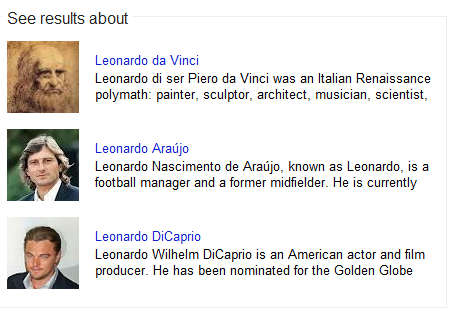| Google Search Goes Semantic - The Knowledge Graph |
| Written by Mike James | |||
| Friday, 18 May 2012 | |||
|
The most reasonable response to Google's recent announcement of the Knowledge Graph is "what took you so long?" If Google wants to stay ahead in search, it has to innovate and, since the introduction of the page rank algorithm, core innovation has been very slow. What Google has announced is at best a move towards a more semantic search algorithm and at worst another tweak to an approach to search that is becoming increasingly ad-hoc and fragmented. The problem with search, as we all know, is that it doesn't work very well. To make up for this we have developed skills at searching, picking keywords that are likely to get the result we are looking for and not accidentally connected topics.
This isn't really satisfactory and overall the whole system is far too easy to spoof, as witnessed by the usually large number of irrelevant results that cluster at the top of the search page. Currently Google search fails at very many simple tasks that if the company had its eye on the ball would have been fixed long ago. For example, if you are looking for a review of a product your results are usually swamped by sites asking you to provide a review of the product. If you want to know about Leonardo da Vinci and type in "Leonardo" then you get results like "Buy a Leonardo from X". The latest idea probably won't make a huge difference, but at least it represents a coherent and new approach to search. Unfortunately, the Knowledge Graph that Google has started using isn't described in sufficient detail to get an inside view of how it works. What Google says is that it organizes data into objects. So, for example, when you search for Taj Mahal then there will be a number of objects in the graph that are labeled "Taj Mahal", including the famous building, eating places and a musician. The graph is used to provide an extra category of choice to the user via a side-bar. You can use this to pick out a more exact category of object that the search phrase refers to.
So for example, if you select the musician object then you get links that refer to this sub-topic. In many ways, it is as if you searched for "Taj Mahal Musician" - but simpler. The sidebar also provides a summary of each object - most likely culled from Wikipedia - which might well answer your question without any need to click again. The whole system is based on Freebase, which Google acquired in 2010. This is a semantic database that includes sources such as Wikipedia, the World CIA Factbook and so on. There isn't much more information available, other than that Google states that it plans to make search understand things and their relationships ever more strongly in the future.
Interestingly, if you check out "Taj Mahal", which is Google's example search, with and without Knowledge Graph you discover that the results are not that different. Without it you get results on the first page that include the building and the musician but not the casino. You also don't get the handy summaries of each "object". So the verdict is that it's handy but at the moment not really essential. The side of the equation that Google isn't talking about is how the links get associated with the semantic objects. Yes, you may want to know about the Taj Mahal the musician, but will this deliver links to high quality content or the same links you would get if you searched for "Taj Mahal Musician". A quick and unscientific test seems to reveal that you get virtually the same results from both. The whole approach to search has to become increasingly semantic. The sorts of methods that we currently use are simply stop-gaps that try to make up for the fact that the search engines don't understand the client or the articles at the end of the links they harvest. Without understanding there can be no reliable ranking of the importance of content and no interpretation of the search phrase. Google has a lot of experience in AI and it is about time, and only natural, that it applies this to search - its core business. However, Google is not alone in this endeavour. Microsoft has been working on Satori, an "entity engine", and a "snapshot" sidebar, which no doubt it will roll out as part of Bing in the near future. In addition, there is Wolfram Alpha, which seems to get better as its use allows it to learn from mistakes. Perhaps the real competitor is Apple's Siri, which aims to bring Alpha's intelligence to the mobile user without even the need to type a query. It may be difficult to think of a world where Google is not the top search provider but only a short time ago there was only Yahoo and then Google introduced Page Rank to destabilize the market. A sufficiently intelligent search engine could do the same again. One speculation is that it is in the Web search engine that strong AI will first appear as a commodity algorithm.
More InformationRelated ArticlesGoogle Needs a New Search Algorithm
Comments
or email your comment to: comments@i-programmer.info
To be informed about new articles on I Programmer, subscribe to the RSS feed, follow us on Google+, Twitter, Linkedin or Facebook, install the I Programmer Toolbar or sign up for our weekly newsletter.
|
|||
| Last Updated ( Tuesday, 22 May 2012 ) |


